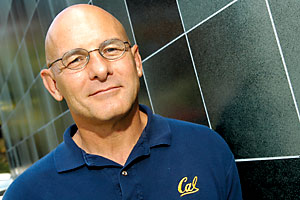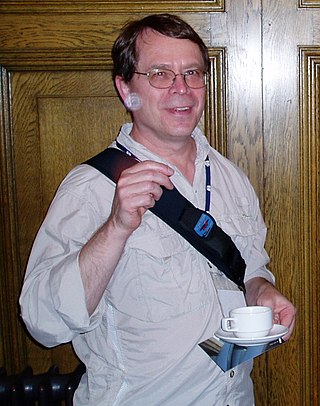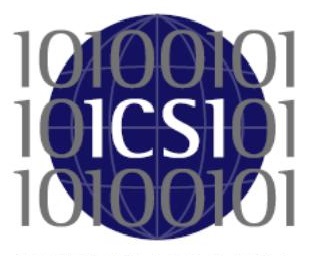
David Andrew Patterson is an American computer pioneer and academic who has held the position of professor of computer science at the University of California, Berkeley since 1976. He announced retirement in 2016 after serving nearly forty years, becoming a distinguished software engineer at Google. He currently is vice chair of the board of directors of the RISC-V Foundation, and the Pardee Professor of Computer Science, Emeritus at UC Berkeley.

Van Jacobson is an American computer scientist, renowned for his work on TCP/IP network performance and scaling. He is one of the primary contributors to the TCP/IP protocol stack—the technological foundation of today’s Internet. Since 2013, Jacobson is an adjunct professor at the University of California, Los Angeles (UCLA) working on Named Data Networking.

Srinivasan Keshav is an American-Canadian Computer Scientist of Indian descent who is currently the Robert Sansom Professor of Computer Science at the University of Cambridge.
Scott J. Shenker is an American computer scientist, and professor of computer science at the University of California, Berkeley. He is also the leader of the Extensible Internet Group at the International Computer Science Institute in Berkeley, California.

The International Computer Science Institute (ICSI) is an independent, non-profit research organization located in Berkeley, California, United States. Since its founding in 1988, ICSI has maintained an affiliation agreement with the University of California, Berkeley, where several of its members hold faculty appointments.
Randy Howard Katz is a distinguished professor at University of California, Berkeley of the electrical engineering and computer science department.

Eric Allen Brewer is professor emeritus of computer science at the University of California, Berkeley and vice-president of infrastructure at Google. His research interests include operating systems and distributed computing. He is known for formulating the CAP theorem about distributed network applications in the late 1990s.
Hari Balakrishnan is the Fujitsu Professor of Computer Science and Artificial Intelligence in the Department of Electrical Engineering and Computer Science at MIT, and the Co-founder and CTO at Cambridge Mobile Telematics.
Sally Jean Floyd was an American computer scientist known for her work on computer networking. Formerly associated with the International Computer Science Institute in Berkeley, California, she retired in 2009 and died in August 2019. She is best known for her work on Internet congestion control, and was in 2007 one of the top-ten most cited researchers in computer science.
Robert W. Brodersen is a professor of electrical engineering, now emeritus, and a founder of the Berkeley Wireless Research Center (BWRC) at the University of California, Berkeley.

Jitendra Malik is an Indian-American academic who is the Arthur J. Chick Professor of Electrical Engineering and Computer Sciences at the University of California, Berkeley. He is known for his research in computer vision.

Ion Stoica is a Romanian-American computer scientist specializing in distributed systems, cloud computing and computer networking. He is a professor of computer science at the University of California, Berkeley and co-director of AMPLab. He co-founded Conviva and Databricks with other original developers of Apache Spark.
Sylvia Ratnasamy is a Belgian-Indian computer scientist. She is best known as one of the inventors of the distributed hash table (DHT). Her doctoral dissertation proposed the content-addressable networks, one of the original DHTs, and she received the ACM Grace Murray Hopper Award in 2014 for this work. She is currently a professor at the University of California, Berkeley.

Fernando Boavida is a Portuguese computer scientist, informatics engineer, university professor, and writer, recognized as a pioneer of network science research and internet in the University of Coimbra and in Portugal.
Venkata Narayana Padmanabhan is a computer scientist and principal researcher at Microsoft Research India. He is known for his research in networked and mobile systems. He is an elected fellow of the Indian National Academy of Engineering, Institute of Electrical and Electronics Engineers and the Association for Computing Machinery. The Council of Scientific and Industrial Research, the apex agency of the Government of India for scientific research, awarded him the Shanti Swarup Bhatnagar Prize for Science and Technology, one of the highest Indian science awards for his contributions to Engineering Sciences in 2016.
Adrian Perrig is a Swiss computer science researcher and professor at ETH Zurich, leading the Network Security research group. His research focuses on networking and systems security, and specifically on the design of a secure next-generation internet architecture.

Salman A. Avestimehr is a Dean's professor at the Electrical & Computer Engineering and Computer Science Departments of University of Southern California, where he is the inaugural director of the USC-Amazon Center for Secure and Trusted Machine Learning and the director of the Information Theory and Machine Learning (vITAL) research lab. He is also the CEO and Co-Founder of FedML. Avestimehr's contributions in research and publications are in the areas of information theory, machine learning, large-scale distributed computing, and secure/private computing and learning. In particular, he is best known for deterministic approximation approaches to network information theory and coded computing. He was a general co-chair of the 2020 International Symposium on Information Theory (ISIT), and is a Fellow of IEEE. He is also co-authors of four books titled “An Approximation Approach to Network Information Theory”, “Multihop Wireless Networks: A Unified Approach to Relaying and Interference Management”, “Coded Computing”, and “Problem Solving Strategies for Elementary-School Math.”
J. J. Garcia-Luna-Aceves is Distinguished Professor of Computer Science and Engineering at University of California at Santa Cruz UCSC, holding the Jack Baskin Endowed Chair of Computer Engineering, is CITRIS Campus Director for UCSC, and is a Principal Scientist at the Xerox Palo Alto Research Center. He is a Fellow of the IEEE and the AAAS.









